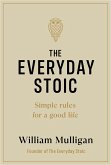11,99 €
inkl. MwSt.
Sofort lieferbar

6 °P sammeln
- Gebundenes Buch
- Merkliste
- Auf die Merkliste
- Bewerten Bewerten
- Teilen
- Produkt teilen
- Produkterinnerung
- Produkterinnerung
DISCOVER THE ENDURING LEGACY OF ANCIENT STOICISM
Since Roman antiquity, Lucius Annaeus Seneca's Letters have been one of the greatest expressions of Stoic philosophy. In a highly accessible and timeless way, Seneca reveals the importance of cultivating virtue and the fleeting nature of time, and how being clear sighted about death allows us to live a life of meaning and contentment.
Letters from a Stoic continues to fascinate and inspire new generations of readers, including those interested in mindfulness and psychological techniques for well-being.
This deluxe hardback selected…mehr
Andere Kunden interessierten sich auch für
![On the Shortness of Life On the Shortness of Life]() Lucius Annaeus SenecaOn the Shortness of Life19,99 €
Lucius Annaeus SenecaOn the Shortness of Life19,99 €![On the Shortness of Life On the Shortness of Life]() Lucius Annaeus SenecaOn the Shortness of Life8,49 €
Lucius Annaeus SenecaOn the Shortness of Life8,49 €![Meditations Meditations]() Marcus AureliusMeditations12,99 €
Marcus AureliusMeditations12,99 €![The Nicomachean Ethics The Nicomachean Ethics]() AristotleThe Nicomachean Ethics9,99 €
AristotleThe Nicomachean Ethics9,99 €![Utopia Utopia]() Thomas MoreUtopia10,99 €
Thomas MoreUtopia10,99 €![The Everyday Stoic The Everyday Stoic]() William MulliganThe Everyday Stoic13,99 €
William MulliganThe Everyday Stoic13,99 €![Being Happy Being Happy]() n Epicurus / aBeing Happy6,99 €
n Epicurus / aBeing Happy6,99 €-
-
-
DISCOVER THE ENDURING LEGACY OF ANCIENT STOICISM
Since Roman antiquity, Lucius Annaeus Seneca's Letters have been one of the greatest expressions of Stoic philosophy. In a highly accessible and timeless way, Seneca reveals the importance of cultivating virtue and the fleeting nature of time, and how being clear sighted about death allows us to live a life of meaning and contentment.
Letters from a Stoic continues to fascinate and inspire new generations of readers, including those interested in mindfulness and psychological techniques for well-being.
This deluxe hardback selected edition includes Seneca's first 65 letters from the Richard M. Gummere translation. An insightful introduction by Donald Robertson traces Seneca's busy life at the centre of Roman power, explores how he reconciled his Stoic outlook with vast personal wealth, and highlights Seneca's relevance for the modern reader.
Hinweis: Dieser Artikel kann nur an eine deutsche Lieferadresse ausgeliefert werden.
Since Roman antiquity, Lucius Annaeus Seneca's Letters have been one of the greatest expressions of Stoic philosophy. In a highly accessible and timeless way, Seneca reveals the importance of cultivating virtue and the fleeting nature of time, and how being clear sighted about death allows us to live a life of meaning and contentment.
Letters from a Stoic continues to fascinate and inspire new generations of readers, including those interested in mindfulness and psychological techniques for well-being.
This deluxe hardback selected edition includes Seneca's first 65 letters from the Richard M. Gummere translation. An insightful introduction by Donald Robertson traces Seneca's busy life at the centre of Roman power, explores how he reconciled his Stoic outlook with vast personal wealth, and highlights Seneca's relevance for the modern reader.
Hinweis: Dieser Artikel kann nur an eine deutsche Lieferadresse ausgeliefert werden.
Produktdetails
- Produktdetails
- Capstone Classics
- Verlag: Capstone / Wiley & Sons
- Artikelnr. des Verlages: 1W119751350
- 1. Auflage
- Seitenzahl: 416
- Erscheinungstermin: 25. März 2021
- Englisch
- Abmessung: 203mm x 136mm x 40mm
- Gewicht: 532g
- ISBN-13: 9781119751359
- ISBN-10: 1119751357
- Artikelnr.: 60094533
- Herstellerkennzeichnung
- Libri GmbH
- Europaallee 1
- 36244 Bad Hersfeld
- gpsr@libri.de
- Capstone Classics
- Verlag: Capstone / Wiley & Sons
- Artikelnr. des Verlages: 1W119751350
- 1. Auflage
- Seitenzahl: 416
- Erscheinungstermin: 25. März 2021
- Englisch
- Abmessung: 203mm x 136mm x 40mm
- Gewicht: 532g
- ISBN-13: 9781119751359
- ISBN-10: 1119751357
- Artikelnr.: 60094533
- Herstellerkennzeichnung
- Libri GmbH
- Europaallee 1
- 36244 Bad Hersfeld
- gpsr@libri.de
Lucius Annaeus Seneca was a Roman philosopher, statesman, orator and tragedian. He was one of Rome's leading intellectual figures in the mid-1st century CE, and as Emperor Nero's closest adviser effectively governed Rome for five years. Seneca was born in Corduba in Hispania, raised in Rome, and trained in rhetoric and philosophy. His many essays and letters make him a central figure in the history of Stoicism. Donald Robertson is a cognitive-behavioural psychotherapist, writer, and trainer, specializing in the relationship between philosophy, psychology, and self-improvement. He's particularly known for his work on Stoic philosophy, and is the author of How To Think Like A Roman Emperor: The Stoic Philosophy of Marcus Aurelius. Tom Butler-Bowdon is Series Editor of the Capstone Classics series, and has provided Introductions for Plato's Republic, Adam Smith's Wealth of Nations , Machiavelli's The Prince, Florence Scovel Shinn's The Game of Life and How to Play It, and Kahlil Gibran's The Prophet. A graduate of the London School of Economics, he is also the author of 50 Economics Classics (2017) and 50 Politics Classics (2015). www.butler-bowdon.com
An Introduction ix
About Donald Robertson xxxiii
About Tom Butler-Bowdon xxxiv
Chapter One On the Use of Time 1
Chapter Two On Discursiveness in Reading 5
Chapter Three On True and False Friendship 9
Chapter Four On the Terrors of Death 13
Chapter Five On the Philosopher's Mean 19
Chapter Six On Sharing Knowledge 23
Chapter Seven On Crowds 27
Chapter Eight On the Philosopher's Seclusion 33
Chapter Nine On Philosophy and Friendship 39
Chapter Ten On Living to Oneself 49
Chapter Eleven On the Blush of Modesty 53
Chapter Twelve On Old Age 57
Chapter Thirteen On Groundless Fears 63
Chapter Fourteen On the Reasons for Withdrawing from the World 71
Chapter Fifteen On Brawn and Brains 79
Chapter Sixteen On Philosophy, the Guide of Life 85
Chapter Seventeen On Philosophy and Riches 91
Chapter Eighteen On Festivals and Fasting 97
Chapter Nineteen On Worldliness and Retirement 105
Chapter Twenty On Practising What You Preach 113
Chapter Twenty One On the Renown Which My Writings May Bring You 119
Chapter Twenty Two On the Futility of Half-Way Measures 125
Chapter Twenty Three On the True Joy Which Comes from Philosophy 133
Chapter Twenty Four On Despising Death 139
Chapter Twenty Five On Reformation 151
Chapter Twenty Six On Old Age and Death 155
Chapter Twenty Seven On the Good Which Abides 161
Chapter Twenty Eight On Travel as a Cure for Discontent 167
Chapter Twenty Nine On the Critical Condition of Marcellinus 171
Chapter Thirty On Conquering the Conqueror 177
Chapter Thirty One On Siren Songs 185
Chapter Thirty Two On Progress 191
Chapter Thirty Three On the Futility of Learning Maxims 195
Chapter Thirty Four On a Promising Pupil 201
Chapter Thirty Five On the Friendship of Kindred Minds 203
Chapter Thirty Six On the Value of Retirement 207
Chapter Thirty Seven On Allegiance to Virtue 213
Chapter Thirty Eight On Quiet Conversation 217
Chapter Thirty Nine On Noble Aspirations 219
Chapter Forty On the Proper Style for a Philosopher's Discourse 223
Chapter Forty One On the God Within Us 231
Chapter Forty Two On Values 237
Chapter Forty Three On the Relativity of Fame 241
Chapter Forty Four On Philosophy and Pedigrees 243
Chapter Forty Five On Sophistical Argumentation 247
Chapter Forty Six On a New Book by Lucilius 253
Chapter Forty Seven On Master and Slave 255
Chapter Forty Eight On Quibbling as Unworthy of the Philosopher 265
Chapter Forty Nine On the Shortness of Life 273
Chapter Fifty On Our Blindness and Its Cure 279
Chapter Fifty One On Baiae and Morals 283
Chapter Fifty Two On Choosing Our Teachers 289
Chapter Fifty Three On the Faults of the Spirit 297
Chapter Fifty Four On Asthma and Death 303
Chapter Fifty Five On Vatia's Villa 307
Chapter Fifty Six On Quiet and Study 313
Chapter Fifty Seven On the Trials of Travel 321
Chapter Fifty Eight On Being 325
Chapter Fifty Nine On Pleasure and Joy 341
Chapter Sixty On Harmful Prayers 351
Chapter Sixty One On Meeting Death Cheerfully 353
Chapter Sixty Two On Good Company 355
Chapter Sixty Three On Grief for Lost Friends 357
Chapter Sixty Four On the Philosopher's Task 365
Chapter Sixty Five On the First Cause 371
About Donald Robertson xxxiii
About Tom Butler-Bowdon xxxiv
Chapter One On the Use of Time 1
Chapter Two On Discursiveness in Reading 5
Chapter Three On True and False Friendship 9
Chapter Four On the Terrors of Death 13
Chapter Five On the Philosopher's Mean 19
Chapter Six On Sharing Knowledge 23
Chapter Seven On Crowds 27
Chapter Eight On the Philosopher's Seclusion 33
Chapter Nine On Philosophy and Friendship 39
Chapter Ten On Living to Oneself 49
Chapter Eleven On the Blush of Modesty 53
Chapter Twelve On Old Age 57
Chapter Thirteen On Groundless Fears 63
Chapter Fourteen On the Reasons for Withdrawing from the World 71
Chapter Fifteen On Brawn and Brains 79
Chapter Sixteen On Philosophy, the Guide of Life 85
Chapter Seventeen On Philosophy and Riches 91
Chapter Eighteen On Festivals and Fasting 97
Chapter Nineteen On Worldliness and Retirement 105
Chapter Twenty On Practising What You Preach 113
Chapter Twenty One On the Renown Which My Writings May Bring You 119
Chapter Twenty Two On the Futility of Half-Way Measures 125
Chapter Twenty Three On the True Joy Which Comes from Philosophy 133
Chapter Twenty Four On Despising Death 139
Chapter Twenty Five On Reformation 151
Chapter Twenty Six On Old Age and Death 155
Chapter Twenty Seven On the Good Which Abides 161
Chapter Twenty Eight On Travel as a Cure for Discontent 167
Chapter Twenty Nine On the Critical Condition of Marcellinus 171
Chapter Thirty On Conquering the Conqueror 177
Chapter Thirty One On Siren Songs 185
Chapter Thirty Two On Progress 191
Chapter Thirty Three On the Futility of Learning Maxims 195
Chapter Thirty Four On a Promising Pupil 201
Chapter Thirty Five On the Friendship of Kindred Minds 203
Chapter Thirty Six On the Value of Retirement 207
Chapter Thirty Seven On Allegiance to Virtue 213
Chapter Thirty Eight On Quiet Conversation 217
Chapter Thirty Nine On Noble Aspirations 219
Chapter Forty On the Proper Style for a Philosopher's Discourse 223
Chapter Forty One On the God Within Us 231
Chapter Forty Two On Values 237
Chapter Forty Three On the Relativity of Fame 241
Chapter Forty Four On Philosophy and Pedigrees 243
Chapter Forty Five On Sophistical Argumentation 247
Chapter Forty Six On a New Book by Lucilius 253
Chapter Forty Seven On Master and Slave 255
Chapter Forty Eight On Quibbling as Unworthy of the Philosopher 265
Chapter Forty Nine On the Shortness of Life 273
Chapter Fifty On Our Blindness and Its Cure 279
Chapter Fifty One On Baiae and Morals 283
Chapter Fifty Two On Choosing Our Teachers 289
Chapter Fifty Three On the Faults of the Spirit 297
Chapter Fifty Four On Asthma and Death 303
Chapter Fifty Five On Vatia's Villa 307
Chapter Fifty Six On Quiet and Study 313
Chapter Fifty Seven On the Trials of Travel 321
Chapter Fifty Eight On Being 325
Chapter Fifty Nine On Pleasure and Joy 341
Chapter Sixty On Harmful Prayers 351
Chapter Sixty One On Meeting Death Cheerfully 353
Chapter Sixty Two On Good Company 355
Chapter Sixty Three On Grief for Lost Friends 357
Chapter Sixty Four On the Philosopher's Task 365
Chapter Sixty Five On the First Cause 371
An Introduction ix
About Donald Robertson xxxiii
About Tom Butler-Bowdon xxxiv
Chapter One On the Use of Time 1
Chapter Two On Discursiveness in Reading 5
Chapter Three On True and False Friendship 9
Chapter Four On the Terrors of Death 13
Chapter Five On the Philosopher's Mean 19
Chapter Six On Sharing Knowledge 23
Chapter Seven On Crowds 27
Chapter Eight On the Philosopher's Seclusion 33
Chapter Nine On Philosophy and Friendship 39
Chapter Ten On Living to Oneself 49
Chapter Eleven On the Blush of Modesty 53
Chapter Twelve On Old Age 57
Chapter Thirteen On Groundless Fears 63
Chapter Fourteen On the Reasons for Withdrawing from the World 71
Chapter Fifteen On Brawn and Brains 79
Chapter Sixteen On Philosophy, the Guide of Life 85
Chapter Seventeen On Philosophy and Riches 91
Chapter Eighteen On Festivals and Fasting 97
Chapter Nineteen On Worldliness and Retirement 105
Chapter Twenty On Practising What You Preach 113
Chapter Twenty One On the Renown Which My Writings May Bring You 119
Chapter Twenty Two On the Futility of Half-Way Measures 125
Chapter Twenty Three On the True Joy Which Comes from Philosophy 133
Chapter Twenty Four On Despising Death 139
Chapter Twenty Five On Reformation 151
Chapter Twenty Six On Old Age and Death 155
Chapter Twenty Seven On the Good Which Abides 161
Chapter Twenty Eight On Travel as a Cure for Discontent 167
Chapter Twenty Nine On the Critical Condition of Marcellinus 171
Chapter Thirty On Conquering the Conqueror 177
Chapter Thirty One On Siren Songs 185
Chapter Thirty Two On Progress 191
Chapter Thirty Three On the Futility of Learning Maxims 195
Chapter Thirty Four On a Promising Pupil 201
Chapter Thirty Five On the Friendship of Kindred Minds 203
Chapter Thirty Six On the Value of Retirement 207
Chapter Thirty Seven On Allegiance to Virtue 213
Chapter Thirty Eight On Quiet Conversation 217
Chapter Thirty Nine On Noble Aspirations 219
Chapter Forty On the Proper Style for a Philosopher's Discourse 223
Chapter Forty One On the God Within Us 231
Chapter Forty Two On Values 237
Chapter Forty Three On the Relativity of Fame 241
Chapter Forty Four On Philosophy and Pedigrees 243
Chapter Forty Five On Sophistical Argumentation 247
Chapter Forty Six On a New Book by Lucilius 253
Chapter Forty Seven On Master and Slave 255
Chapter Forty Eight On Quibbling as Unworthy of the Philosopher 265
Chapter Forty Nine On the Shortness of Life 273
Chapter Fifty On Our Blindness and Its Cure 279
Chapter Fifty One On Baiae and Morals 283
Chapter Fifty Two On Choosing Our Teachers 289
Chapter Fifty Three On the Faults of the Spirit 297
Chapter Fifty Four On Asthma and Death 303
Chapter Fifty Five On Vatia's Villa 307
Chapter Fifty Six On Quiet and Study 313
Chapter Fifty Seven On the Trials of Travel 321
Chapter Fifty Eight On Being 325
Chapter Fifty Nine On Pleasure and Joy 341
Chapter Sixty On Harmful Prayers 351
Chapter Sixty One On Meeting Death Cheerfully 353
Chapter Sixty Two On Good Company 355
Chapter Sixty Three On Grief for Lost Friends 357
Chapter Sixty Four On the Philosopher's Task 365
Chapter Sixty Five On the First Cause 371
About Donald Robertson xxxiii
About Tom Butler-Bowdon xxxiv
Chapter One On the Use of Time 1
Chapter Two On Discursiveness in Reading 5
Chapter Three On True and False Friendship 9
Chapter Four On the Terrors of Death 13
Chapter Five On the Philosopher's Mean 19
Chapter Six On Sharing Knowledge 23
Chapter Seven On Crowds 27
Chapter Eight On the Philosopher's Seclusion 33
Chapter Nine On Philosophy and Friendship 39
Chapter Ten On Living to Oneself 49
Chapter Eleven On the Blush of Modesty 53
Chapter Twelve On Old Age 57
Chapter Thirteen On Groundless Fears 63
Chapter Fourteen On the Reasons for Withdrawing from the World 71
Chapter Fifteen On Brawn and Brains 79
Chapter Sixteen On Philosophy, the Guide of Life 85
Chapter Seventeen On Philosophy and Riches 91
Chapter Eighteen On Festivals and Fasting 97
Chapter Nineteen On Worldliness and Retirement 105
Chapter Twenty On Practising What You Preach 113
Chapter Twenty One On the Renown Which My Writings May Bring You 119
Chapter Twenty Two On the Futility of Half-Way Measures 125
Chapter Twenty Three On the True Joy Which Comes from Philosophy 133
Chapter Twenty Four On Despising Death 139
Chapter Twenty Five On Reformation 151
Chapter Twenty Six On Old Age and Death 155
Chapter Twenty Seven On the Good Which Abides 161
Chapter Twenty Eight On Travel as a Cure for Discontent 167
Chapter Twenty Nine On the Critical Condition of Marcellinus 171
Chapter Thirty On Conquering the Conqueror 177
Chapter Thirty One On Siren Songs 185
Chapter Thirty Two On Progress 191
Chapter Thirty Three On the Futility of Learning Maxims 195
Chapter Thirty Four On a Promising Pupil 201
Chapter Thirty Five On the Friendship of Kindred Minds 203
Chapter Thirty Six On the Value of Retirement 207
Chapter Thirty Seven On Allegiance to Virtue 213
Chapter Thirty Eight On Quiet Conversation 217
Chapter Thirty Nine On Noble Aspirations 219
Chapter Forty On the Proper Style for a Philosopher's Discourse 223
Chapter Forty One On the God Within Us 231
Chapter Forty Two On Values 237
Chapter Forty Three On the Relativity of Fame 241
Chapter Forty Four On Philosophy and Pedigrees 243
Chapter Forty Five On Sophistical Argumentation 247
Chapter Forty Six On a New Book by Lucilius 253
Chapter Forty Seven On Master and Slave 255
Chapter Forty Eight On Quibbling as Unworthy of the Philosopher 265
Chapter Forty Nine On the Shortness of Life 273
Chapter Fifty On Our Blindness and Its Cure 279
Chapter Fifty One On Baiae and Morals 283
Chapter Fifty Two On Choosing Our Teachers 289
Chapter Fifty Three On the Faults of the Spirit 297
Chapter Fifty Four On Asthma and Death 303
Chapter Fifty Five On Vatia's Villa 307
Chapter Fifty Six On Quiet and Study 313
Chapter Fifty Seven On the Trials of Travel 321
Chapter Fifty Eight On Being 325
Chapter Fifty Nine On Pleasure and Joy 341
Chapter Sixty On Harmful Prayers 351
Chapter Sixty One On Meeting Death Cheerfully 353
Chapter Sixty Two On Good Company 355
Chapter Sixty Three On Grief for Lost Friends 357
Chapter Sixty Four On the Philosopher's Task 365
Chapter Sixty Five On the First Cause 371







